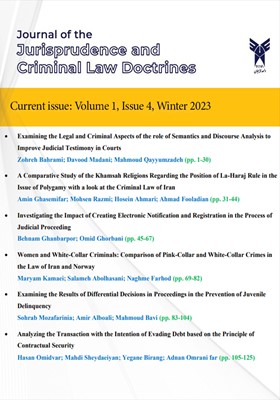Investigating the Impact of Creating Electronic Notification and Registration in the Process of Judicial Proceeding
Subject Areas : Jurisprudence and Criminal Law Doctrines
Behnam Ghanbarpor
1
*
![]() ,
OMID GHORBANI
2
,
OMID GHORBANI
2
1 - Assistant Professor of Law Department, Qaimshahr Branch, Islamic Azad University, Qaimshahr, Iran
2 - Doctoral student of private law, Qaim Shahr Branch, Islamic Azad University, Qaim Shahr, Iran
Keywords: Proceedings, Electronic Registration, Electronic notification, judicial electronic services,
Abstract :
Today, in the judiciary, very high volume of the current cases is very high and on the other hand, the number of incoming cases is increasing. On the other hand, the imposition of costs and the prolongation of the proceedings and the use of traditional cases such as traditional notification by notification agents and the like, lead to a decrease in accuracy during the proceedings and ultimately the dissatisfaction of the clients. One of the methods that is now used to reduce the delay of proceedings and also to reduce disruptions in the proceedings (crimes against judicial justice) is electronic communication based on the network. Therefore, in this study, the effect of electronic notification and registration on the process of dealing with judicial cases was investigated. Studies show that electronic notification and registration has a positive effect on the process of dealing with judicial cases. Increasing the quality of proceedings, increasing the speed of proceedings, providing electronic services to the people and the parties to the case, improving the ability of judicial supervision and reforming the statistical system, increasing the speed of response, not having to go to the court and controlling the case around the clock, registering the details of witnesses and informants in order to identify profiteers in different cases, preventing manipulation of documents and non-interference in the contents of the notification are among the advantages of electronic notification. From the point of view of clients and judges, the positive effect of electronic notification on judicial cases is the condition of updating and optimizing the electronic notification system, increasing the speed and reducing errors, increasing the security of the system, increasing awareness and training clients to use the electronic notification system, recording events along with date of bills and annexes as well as facilitating logging into the system can be effective in increasing the speed of judicial cases.
کتاب شناسی
16.Velicogna, M., (2007), »Tems and ICT What can be Learned from Europe?« , Utrecht law review, Volume 3, Issue 1.
_||_1) Dadgar, Sayyed Mohsen, Ghavam Karimi, Mahdi, (1395), »The Role of Electronic Systems and Services and it’s Effect on the Increase and Accuracy of Proceedings in Iran’s Legal System« , World Conference on Psychology and Educational Sciences, Law and Social Sciences at the Beginning of the Third Millennium, Shiraz, Ideh Bazare Sanate Sabz Company’s research.
2) Fabri, M., F. Contini (eds), (2003), The Judicial Electronic Data Interchange in Europe: Applications, Policies and Trends, Bologna, Lo Scarabeo.
3) Golbaghi Masouleh, Sayyed Ali Jabbar, (1401), » Situational Prevention with Approach of Environmental Design in Decreasing Theft of Social Housing «, quarterly journal of Jurisprudence and Criminal Law Doctrines, No.2, 85-106.
4) Haji Tabar Firouzjaei, Hasan, (1392), » Crimes against Facilitators of Judicial Justice and its Prevention« , Journal of Crime Prevention Studies, Summer, No.27, page 7.
5) Hendiani, Abdollah, Molana, Shaghayegh, (1390), » The Effect of Traditional Reasons on the Occurrence of Judicial Mistakes in Criminal Cases« , Detective Magazine, Vol.2, No.4, pp.108-85.
6) Kashani, Sayyed Mahmoud (1389), Global Standards of Administration of Justice, Tehran: Mizan publication.
7) Loveday, B., (2000), »Adress to EGPA conference, cape sounion, Greece« in M.Fabri et al. (eds), » The challenge of change for Judicial systems« , IOS Press.
8)Mirmohammad Sadeghi, Hossein, Abed, Rasoul, (1391), » The Jurisdiction of the International Criminal Court in dealing with Crimes against Criminal Justice with a Case Study of Thomas Lubango’s Case«, quarterly journal of Judicial Law Approaches, Issue.17, No.57, 181-204.
9) Mohseni, Hasan, Rezaeinezhad, Homayun, (1391), »The Administration of Justice and the Progress of Information and Communication Technology« , Journal of Legal Studies of Shiraz University, Vol.4, No.2, pp. 117-132.
10) Nazeri, Amir Hossein, (1394), »Investigation of the Effect of Using the CMS Judicial Case Management System in Improving the Criminal Proceedings, a Case Study: Imam Khomeini Judicial Complex, Mashhad« , National Conference of Humanities, 1-22.
11) Shahsavand, Mehdi, Khojasteh Bakht, Mojtaba, (1388), »Management System of Judicial Cases« . Tehran: The official newspaper of the country.
12) Sohrab Big, Amir, (1380), »Methods to Overcome The Judicial Delay« , Tehran: Judiciary Press and Publications Center.
13) Velicogna, M., (2007), »Justice Systems and ICT What can be Learned from Europe?« , Utrecht law review, Volume 3, Issue 1.
14) Walters, Stan B., (1384), »Reducing and Avoiding the Occurrence of False Confessions« , translated by Mahdi Javid, Detective Magazine, November and December, No. 19 &18, pp. 24-36.
15) Zarkalam, Sattar, (1391), »Electronic Proceedings; Necessities, Requirements and Challenges« , Journal of Criminal Law Teachings of Razavi University of Islamic Sciences, Vol.2, No.3, pp. 129-150.
16) Zeraat, Abbas, Mohajeri, Ali, (1387), Description of the Law of P5ocedure of General Courts and Revolution in Criminal Matters, Vol.1, Qom: Feiz Publishing.

